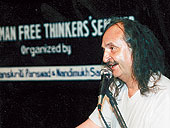 |
| Rational voice: Fritz Hoevels at the seminar (Picture by Alik Sarkar) |
Resurgence of religious intolerance all over the world could throttle the voice of scientific quest. “The suppression of free thinking as well as sceptical examination in a society not just hinders science but threatens with the revival of medieval dogmas,” said Fritz Erik Hoevels, a psychoanalyst and the founder of the Germany-based Bund Gegen Anpassung (alliance against conformity) which has been struggling against religious intolerance for the past 30 years.
Speaking at the Indo-German Free Thinkers’ Seminar, organised by Anish Sanskriti Parishad and Nandimukh Samsad, at Gorky Sadan on June 3, Hoevels traced the rise and decay of tolerance since the days of Voltaire ? in the 18th century. “Voltaire and his companions knew tolerance would lead to the victory of reason in human minds,” said Hoevels. Voltaire was convinced that it was because of their personal liberty that the English ? notably Isaac Newton and John Locke ? were in the forefront of scientific thought. Eventually, Voltaire was able to spread the message of rationality and freedom of expression among the French, and influenced the direction taken by modern mind.
Hoevels believes that the world is slowly regressing towards an era of intolerance as fanaticism spreads its ugly hood. In European countries medieval privileges of the Church are being restored and Islamic fanatics have imposed religious notions on science education. In India, too, Hindu nationalists have revived irrational ideas like astrology.
Later, while speaking to KnowHOW in an interview, Hoevels said that religion has already become a huge hindrance in the progress of stem cell research. “Catholics have raised the strongest objection from the flawed premise that early-stage embryo has life.” He warned that similar irrational ideas about the universe stood as a hurdle in the exposition of the idea that the sun was at the centre of the solar system, for more than 1000 years. “Greek philosopher Aristarchus’ heliocentric model seemed too radical to be accepted by his contemporaries who debunked the theory simply because it conflicted with geocentric religious principles.” Hoevels also thinks that in order to pursue scientific quest one should be free from all conformism or authoritarianism. “A scientist must be an atheist, free from all preconceived notions or prior speculations imposed by religious beliefs.” According to him scientists who say that they are religious are always in two minds ? in a constant state of cognitive dissonance. “It’s a kind of Orwellian realm [remember ‘Big Brother is watching’ in the novel 1984] in which you can never think or work freely.”
But why does religion persist, in spite of such tremendous scientific progress in the last two centuries? How does religious belief work on the human mind? Psychologist Simone Reissner of Germany’s University of Freiburg explored the answers to this question through the psychoanalytic principles of Sigmund Freud in her talk.
“Gods are revealed as nothing more than infantile images of parents, unconsciously stored in an individual’s mind and streamlined by society,” said Reissner. “This is why every successful God begins his (incidentally most Gods are males i.e. father figures) career on a high mountain ? Sinai, Kailash, Olympus or Taishan ? later moving up in the sky or to a high pedestal at a place of worship.” According to her, the raised height emphasises the child’s perspective while confronting with parents or any other adults. Just like a grown-up forces a child to shut up, irritated by its inquisitiveness, a religion too suppresses the natural spirit of inquiry. “Religions have their specific formula [such as constant repetition of some phrase or sound during prayer in gatherings] that forces people to sacrifice intellect and blocks the impulses of reason.”
However, Prof. Sibnarayan Ray, an author and philosopher, thinks it’s not just religion, politics can also stifle free-thinking and the spirit of inquiry. “The human mind has a conflict in itself?it will either give in to an authority or ask questions.” If a society has to thrive it should follow the latter path. Prof. Ray expressed concern that both rationality and the questioning spirit are on the wane. “This is the reason we find so many people flocking to astrologers or buying precious stones and charms for good luck.”










